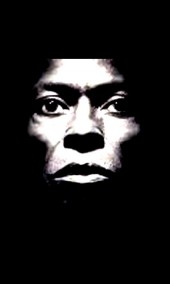Miles Davis is more than a jazz musician: he is a cultural icon, known even to people who can't tell bebop from fusion. That may seem strange considering that Davis made a career of defying the expectations of critics and audience alike, but it is just one more paradox associated with this mercurial artist.
Miles was born in Alton, Illinois on May 26, 1926. He grew up in East St. Louis in a middle class family, playing in his high school band as well as with several local R&B groups. He quickly became enamored of jazz, particularly the new sounds being created by Charlie Parker and Dizzy Gillespie. Davis' father sent him to Juliard to study music, but Miles didn't spend much time there, dropping out to play with Parker's quintet from 1946 to 1948. That proved to be a humbling experience at first, since Miles didn't yethave the chops to keep up with Parker's breakneck tempos and chord substitutions. He learned quickly, though, and grew immensely as a musician during his tenure with Bird.
Next, Miles hooked up with a group of musicians who were doing something completely different. This group included J.J. Johnson, Lee Konitz, Gerry Mulligan, John Lewis, and Max Roach. While all were excellent bop players, they were developing a style that was less volatile and more relaxed, which suited Davis' temperement. The arrangements crafted by Lewis, Mulligan, John Carisi, and Gil Evans added more uniqueness to the nine-piece group's sound. Davis became the group's ad-hoc leader, and the classic Birth of the Cool was the result.
The early 50s were an erratic time for Davis, mostly due to his heroin addiction, and he was a disappointing performer during this time. By the middle of the decade, however, he had cleaned up and formed his first quintet, comprised of Davis, John Coltrane, Red Garland, Paul Chambers, and Philly Joe Jones. This group became very popular and recorded several essential albums for the Prestige label: Cookin', Steamin', Workin', and Relaxin'. When the quintet broke up, Davis spent time collaborating again with arranger Gil Evans, resulting in great albums like Porgy and Bess and Sketches of Spain. He finished the decade out by recording one of the best known jazz albums of all time, Kind of Blue, with a sextet that included Coltrane, Julian "Cannonball" Adderley, Bill Evans, Paul Chambers, and Philly Joe Jones.
In the 1960s Davis put together a second quintet, this time utilizing Wayne Shorter, Herbie Hancock, Tony Williams, and Ron Carter. The music of this group was more complex, moving through post-bop modal experimentation and eventually into some of the group improvisation and open forms of free jazz. Some of Davis' fans were mystified by the group's music, but it was uniformly applauded by critics, other musicians, and avid music fans eager for new sounds. The group's output has recently been collected in the 6-disc set The Complete Columbia Studio Recordings, 1965-'68.
As the 1970s beckoned, Miles realized that rock had replaced jazz as the music of choice for the younger generation. In order not to get left behind, he began to perform with an electronic band: electric guitar, electric bass, banks of electronic keyboards, and even an amplified trumpet. The sound was bubbling, dark, and dense, and it further alienated some jazz fans and many critics as well. There was no denying the power of the music Davis was producing, however: upon its release in 1970, Bitches Brew sold 400,000 copies, making it the best-selling jazz album of all time. The group included Chick Corea, Hancock, John McLaughlin, and others who went on to become mainstays of the jazz fusion movement.
Davis continued to perform and record throughout the 1970s and 1980s, continuing to perform with primarily electronic groups, often playing organ instead of his trumpet, and playing with his back to the audience. Some of the minimalist experiements he performed at the close of the 70s foreshadowed the ambient and electronic music that would become common in the 80s and 90s. Miles died on September 28, 1991, but his music, style, and collaborators all continue to influence not only jazz music, but popular culture as well.
www.myspaceeditor.it
